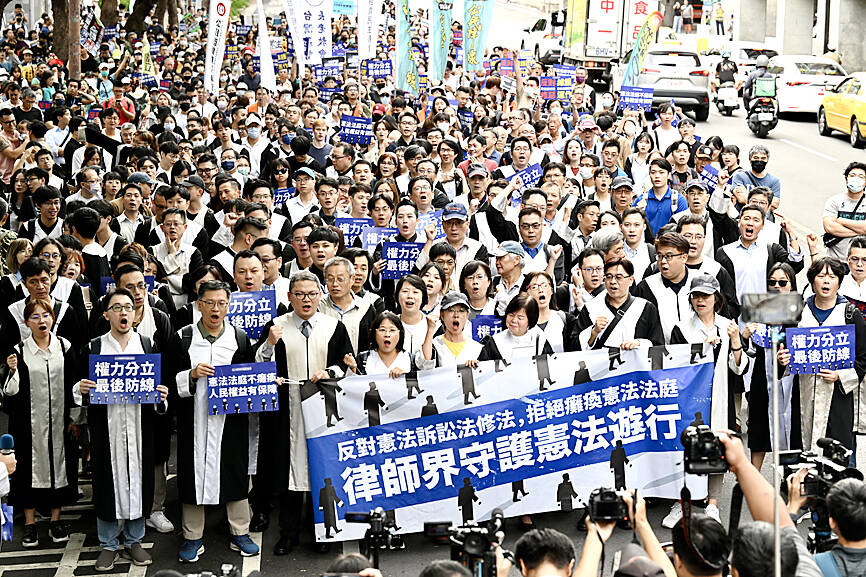More than 300 lawyers yesterday marched in Taipei to protest bills to amend the Constitutional Court Procedure Act (憲法訴訟法).
Under the bills proposed by Chinese Nationalist Party (KMT) Legislator Weng Hsiao-ling (翁曉玲), the Constitutional Court Procedure Act would be changed to specify that the total number of incumbent Constitutional Court justices is 15, while a two-thirds majority would be needed to issue a ruling.
Currently a simple majority is needed for the Constitutional Court to pass a judgement, but under the bills, 10 justices would need to agree in each case. If the legislature does not ratify judicial nominees, there would not be enough justices to oversee a case.

Photo: Lo Pei-de, Taipei Times
A group of 153 lawyers who organized the march said the bills would make it incredibly difficult for justices to rule on cases, which would cripple the court’s operations and restrict the public’s right to demand constitutional interpretations.
Cognito Law Office attorney Jacob Lin (林俊宏) said that more than 95 percent of the petitions for constitutional rulings concerned human rights cases.
Demonstrators urged the legislature to uphold democracy and the rule of law, while calling for heightened public awareness of the severity of the draft amendments and the importance of the Constitutional Court, Lin said.
The lawyers marched while wearing their judicial robes to show their determination to safeguard the constitutional system, he said.
Former justice Huang Hung-hsia (黃虹霞), who was appointed during the administration of former president Ma Ying-jeou (馬英九), also attended the march.
Huang said it would be “unconstitutional” if the bills passed, as they raise the threshold for passing a constitutional ruling and damage social justice.
The draft amendments would groundlessly redefine the total number of incumbent grand justices as stipulated in the Additional Articles of the Constitution of the Republic of China (中華民國憲法增修條文), marchers said.
If passed, the Constitutional Court would have to cease operations whenever there are an insufficient number of justices, they added.
The Constitutional Court is the last line of defense for the nation’s constitutional order and the ultimate judicial mechanism to ensure the protection of human rights and dignity, they said.
Additional reporting by CNA

CHAOS: Iranians took to the streets playing celebratory music after reports of Khamenei’s death on Saturday, while mourners also gathered in Tehran yesterday Iranian Supreme Leader Ayatollah Ali Khamenei was killed in a major attack on Iran launched by Israel and the US, throwing the future of the Islamic republic into doubt and raising the risk of regional instability. Iranian state television and the state-run IRNA news agency announced the 86-year-old’s death early yesterday. US President Donald Trump said it gave Iranians their “greatest chance” to “take back” their country. The announcements came after a joint US and Israeli aerial bombardment that targeted Iranian military and governmental sites. Trump said the “heavy and pinpoint bombing” would continue through the week or as long

TRUST: The KMT said it respected the US’ timing and considerations, and hoped it would continue to honor its commitments to helping Taiwan bolster its defenses and deterrence US President Donald Trump is delaying a multibillion-dollar arms sale to Taiwan to ensure his visit to Beijing is successful, a New York Times report said. The weapons sales package has stalled in the US Department of State, the report said, citing US officials it did not identify. The White House has told agencies not to push forward ahead of Trump’s meeting with Chinese President Xi Jinping (習近平), it said. The two last month held a phone call to discuss trade and geopolitical flashpoints ahead of the summit. Xi raised the Taiwan issue and urged the US to handle arms sales to

A magnitude 5.6 earthquake struck off the coast of Yilan County at 12:37pm today, with clear shaking felt across much of northern Taiwan. There were no immediate reports of damage. The epicenter of the quake was 16.9km east-southeast of Yilan County Hall offshore at a depth of 66.8km, Central Weather Administration (CWA) data showed. The maximum intensity registered at a 4 in Yilan County’s Nanao Township (南澳) on Taiwan’s seven-tier scale. Other parts of Yilan, as well as certain areas of Hualien County, Taipei, New Taipei City, Taoyuan, Hsinchu County, Taichung and Miaoli County, recorded intensities of 3. Residents of Yilan County and Taipei received

Taiwan has secured another breakthrough in fruit exports, with jujubes, dragon fruit and lychees approved for shipment to the EU, the Ministry of Agriculture said yesterday. The Animal and Plant Health Inspection Agency on Thursday received formal notification of the approval from the EU, the ministry said, adding that the decision was expected to expand Taiwanese fruit producers’ access to high-end European markets. Taiwan exported 126 tonnes of lychees last year, valued at US$1.48 million, with Japan accounting for 102 tonnes. Other export destinations included New Zealand, Hong Kong, the US and Australia, ministry data showed. Jujube exports totaled 103 tonnes, valued at